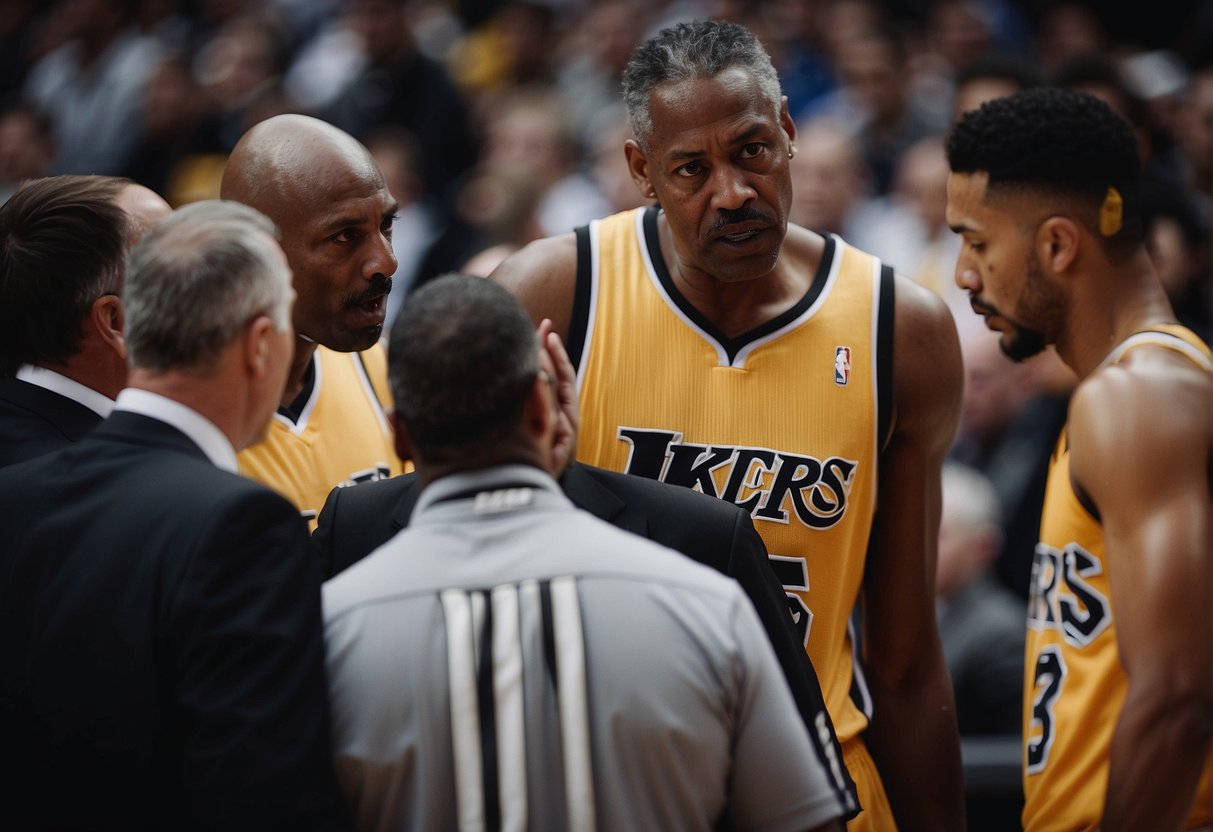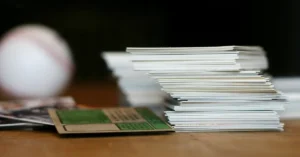Decipher the role of referees in the NBA with my expert knowledge: why do NBA refs have numbers? Explore the significance of referee identification and its impact on officiating.
Why Do NBA Refs Have Numbers? History and Purpose of Numbering
When you watch an NBA game, have you noticed the referees sporting unique numbers on their uniforms? There’s a purpose behind this, deeply rooted in the game’s history and practicality.
In the early days of the NBA, referees were less distinguishable, which sometimes led to confusion. To streamline identification, each referee was assigned a distinct number. This made it easier for players, coaches, and fans to recognize and address the referees.
Identification Purposes: Just as players have numbers, referees’ numbers allow quick and accurate identification. When you see a call made on court, the number helps you know who created the call. It’s also handy for post-game discussions and reviews.
The numbers aren’t just randomly assigned, though. It’s an honor system as well. NBA history shows that numbers of remarkably esteemed refs aren’t reused without their consent. This respects the legacy of long-standing officials.
- Unique Assignment: Every referee receives a unique number.
- Ease of Reference: The numbers simplify how referees are mentioned in reports and documents.
Purpose: Beyond recognition, these numbers are about accountability and performance tracking. In a world where every call can be scrutinized, your referees’ numbers help maintain a clear record of decisions, improving the transparency of the game.
The Role of NBA Referees

Game Management
As an NBA referee, your primary responsibility includes game management. This involves overseeing the game’s flow and ensuring it runs within the time limits. You also have the task of monitoring the actions of players, coaches, and other game personnel.
The positioning on the court is key, as it allows you to maintain a clear view of the play and make accurate calls. The NBA officials, particularly the crew chief, ensure that the games during the regular season and beyond are conducted fairly and in a structured manner.
Enforcement of Rules
In your role, enforcing the rules is crucial. You are responsible for calling fouls, including technical and flagrant fouls and various violations. These could range from traveling to shot clock violations.
Your calls can often determine the flow and outcome of the game. Every call you make as an NBA referee is vital, so your uniform carries a number for identification and accountability. It’s your job to apply the NBA’s established rules consistently to all participants on the court.
Communication and Coordination
Effective communication and coordination with your fellow officials are essential to your role as an NBA referee. You must make the final call with confidence and clarity during a game.
This requires you to constantly sync with the other referees to ensure consistency and fairness in the game’s regulation. Each NBA referee carries a whistle and uses hand signals to communicate their calls to everyone in the arena and those watching the broadcast. The coordination extends beyond the court, involving post-game reviews and discussions to improve performance and consistency.
Assignment and Seniority

Umpire Roles
Your understanding of umpire roles within an NBA game starts with recognizing the structure of the referee team. Each game is typically overseen by a three-member team: one lead referee, the crew chief, and two other referees. The crew chief carries the highest seniority and is primarily responsible for the flow of the game. The other referees support the crew chief by managing different court areas, ensuring comprehensive coverage.
Career Progression
Your progression as an NBA referee is marked by several milestones, from initial assignments to becoming a seasoned crew chief. Initially, your assignments as a new umpire will depend on your training and experience. As your career advances, you move up in seniority, often reflected in the number you wear.
This number becomes a symbol of your experience and standing among your peers. NBA refs work their way through the ranks, and as they gain experience and prove their skills, they are awarded higher-profile games and positions within the refereeing hierarchy.
Rules and Regulations

Regulation Updates
The NBA frequently updates its regulations to uphold fair play and adapt to the evolving nature of the game. At the beginning of each NBA season, the league office releases a set of rules that includes guidelines for referee numbers. It’s worth keeping an eye on these updates, as they may affect how games are officiated from the regular season to the playoffs.
Call Review Process
During NBA games, the referees’ numbers become critical in the call review process. If there’s a contentious call on the court, knowing the specific referee responsible helps everyone involved. The review process becomes streamlined as players, coaches, and the review center can quickly identify who made the call. This is particularly essential during high-stakes games, such as those in the NBA playoffs and NBA Finals, where each decision can significantly impact the outcome.
Training and Performance

As you dive into the world of NBA referees, it’s essential to understand that their numbers are more than just identifiers—they symbolize a commitment to ongoing training and performance. A referee’s continuous journey involves skill development, rigorous performance reviews, and a dedication to excellence that ensures the utmost accountability in every game they officiate.
Skill Development
Your path as an NBA referee begins with intensive training designed to equip you with a broad set of skills necessary to manage the fast-paced nature of professional basketball games. This education focuses on:
- Rule Knowledge: Deep understanding of the NBA rulebook.
- Physical Fitness: Maintaining a high level of stamina and agility.
- Problem-Solving Skills: Quick and effective decision-making in high-pressure situations.
The education extends beyond the court, with workshops and training sessions emphasizing real-world scenarios you will likely face. By honing your skills, you become adept at navigating interactions with players and coaches—crucial to maintaining the flow and integrity of a game.
Performance Reviews
Your performance as an NBA official is closely monitored and regularly evaluated to ensure accountability:
- Game Analysis: Every call you make is reviewed for accuracy and fairness.
- Feedback Loop: Constructive criticism and review from senior referees and league officials.
- Continuous Improvement: Emphasis on learning from each game to refine your officiating capabilities.
These meticulous reviews encourage you to reflect on your decisions, receive feedback, and continuously improve. This discipline not only upholds your professional standard but also reinforces the trust placed in you by everyone involved in the NBA—from the league administration to the fans.
Public Perception and Transparency

NBA referees wearing numbered uniforms not only aid in identification but also play a significant role in ensuring transparency and accountability in the game. You’ll find that these numbers have become a tool for the public to understand and scrutinize the decision-making process on the court.
Dealing with Criticism
Referees are human and can make missed or bad calls, inevitably leading to criticism from fans and teams alike. By having identifiable numbers, NBA referees face the music of public opinion, as each decision can be tracked and discussed. This level of transparency allows for a clear line of accountability and, in turn, promotes fairness in the game. When a controversial call occurs, you can see discussions unfold on forums or look up the specific referee on Wikipedia to find their history and performance.
Understanding Decisions
When it comes to understanding decisions made by officials, NBA referees’ numbers serve as a reference point for clarity and transparency. You can follow which referee made which call, fostering a transparent environment where accountability stands firm. Despite the pressure, this visibility into their performance discourages potential fraud and helps maintain the integrity of the NBA. This aspect of public perception is crucial as it encourages referees to maintain the highest standards of conduct to avoid tarnishing their professional reputation.
Officiating in Different Stages

When you’re watching NBA games, you’ll notice referees in every match, from the preseason to the highly anticipated NBA Finals. Their role, especially in calling fouls, changes across different stages.
Regular Season vs. Playoffs
In the regular season, referees have a tough job maintaining a fair game while balancing calls to keep the game flow going. With 82 games per team, consistency is key in calling fouls and managing NBA players:
- Calls may be less strict compared to playoffs to avoid disrupting game pace.
- Referees often work to strike a balance between control and letting players play.
During the NBA playoffs, the intensity ramps up, and important games put additional pressure on referees. Here’s what changes:
- Each call can have a significant impact; therefore, precision in officiating is crucial.
- NBA Finals bring the best referees who have performed well throughout the season and playoffs.
Special Cases
Occasionally, special cases arise where officiating might differ within the same stage:
- Preseason: Refs might focus on setting the tone for the upcoming season and may call more fouls to reinforce new rules.
- NBA games with high stakes or rivalries can see a tighter whistle to prevent escalations.
In these scenarios, your keen observation will reveal a shift in the referees’ approach to maintaining the game’s integrity while acknowledging its context.
FAQ
Do NBA referees have numbers?
No, NBA referees do not have numbers associated with them in the same way that players do. While referees are identified by their names during broadcasts and official records, they do not have designated numbers like players do.
Who is the referee number 88 in the NBA?
NBA referees do not have specific numbers assigned to them. Referees are identified by their names, and their performances are tracked through various officiating databases, but numbers do not commonly refer to them.
Who is number 91 on the NBA referee?
Similar to the previous answer, NBA referees are not assigned numbers. Their names identify them during games and in official records. Therefore, there is no referee known as number 91 in the NBA.
If you enjoyed reading about the topic: Why Do NBA Refs Have Numbers, leave a comment and stay updated on Pinterest for more exciting basketball news.
Leave me a comment and make sure to also check out NBA Ref Shirt.






